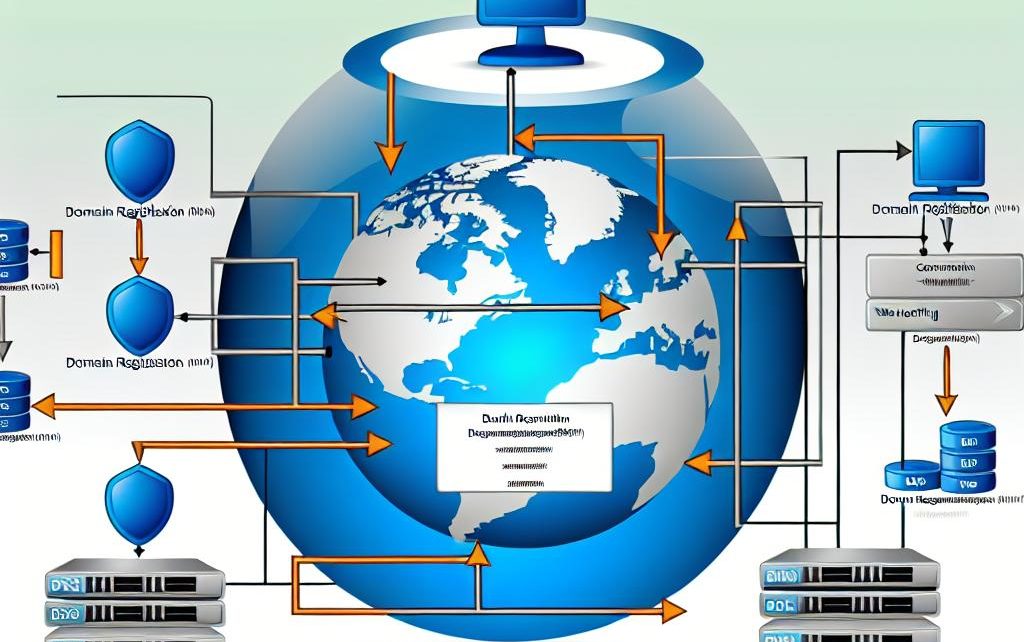The Role of DNS in Hosting and Domain Management
The Domain Name System (DNS) is instrumental in hosting and domain management. It acts by converting domain names that are user-friendly into IP addresses that computers use to find one another on the internet. To achieve efficient domain management and effective hosting, a comprehensive understanding of DNS is essential.
Understanding the Basics of DNS
DNS functions as the address book of the internet. When users type a domain name into their browser, DNS is responsible for turning this domain name into an associated IP address, enabling the browser to access the desired online resources. A thorough grasp of this relationship is beneficial in troubleshooting domain and hosting service issues, ultimately leading to a more efficient internet experience.
DNS Components and Functionality
The DNS process incorporates various components, crucial to its operation:
Domain Names: These serve as memorable and straightforward addresses utilized to access websites instead of complicated IP addresses. Domain names are arranged in a hierarchical structure, separated by dots, representing various levels of domains—such as .com, .org, or .net—that form the top level.
Name Servers: These servers hold DNS records and are responsible for translating domain names into IP addresses. Name servers communicate with each other within the DNS system to retrieve and distribute the data needed for DNS resolution efficiently.
DNS Records: Entries in the DNS database provide pertinent domain information, including IP addresses (A and AAAA records), mail exchanges (MX records), text details (TXT records), and service locations, known as (SRV records). These records facilitate the accurate delivery of web content in response to user requests.
The Impact of DNS on Hosting Services
Choosing the right DNS provider is a mandatory aspect of effective hosting services. Reliable DNS enhances website performance and uptime considerably. Hosting providers often provide DNS management services, which empower users to manage their domain’s DNS settings through their platform efficiently.
Moreover, DNS significantly affects a website’s speed due to resolution time. When DNS services are faster, latency is minimized, leading to quicker load times and consequently, a better user experience for visitors. This enhancement is vital for maintaining a competitive edge in today’s fast-paced digital world.
DNS Role in Domain Management
In domain management, it’s crucial to understand DNS configuration to achieve optimal site and email functionality. Correctly setting up DNS records ensures that emails are delivered efficiently and visitors arrive at the correct destination, which is important for maintaining business operations and customer satisfaction.
Take MX records, for instance; they are paramount for the functionality of email services. If MX records are misconfigured, it could result in undelivered or misrouted emails, affecting communication significantly. Thus, precise DNS configurations are the keystone for streamlined business communications.
Enhancing Security through DNS Management
DNS also plays a role in enhancing security aspects. Aptly managed DNS is crucial in protecting against certain security threats. Technologies like DNSSEC (DNS Security Extensions) are implemented to defend against attacks such as cache poisoning. By enabling DNSSEC, domain managers can assure users that they are not inadvertently redirected to fraudulent websites.
Additionally, DNS-based security solutions are invaluable in mitigating risks. They can identify and block malevolent activities or sites, thereby protecting user data and helping to maintain trust and reliability in digital interactions. Implementing these solutions is a proactive measure towards securing online transactions.
Overall, a profound understanding of DNS’s operational role in hosting and domain management provides significant insights. These insights guide informed decision-making and promote better management of web resources. Since DNS is essentially the backbone of internet navigation, managing it effectively is imperative to ensure a secure and seamless browsing experience, ultimately supporting the fulfillment of business objectives and enhancing user satisfaction.
Moreover, DNS management continues to evolve, aligning with new technological advancements and cybersecurity measures, underscoring its critical role in the modern digital infrastructure. As businesses depend increasingly on the internet for their operations, DNS management will remain a key area of focus to ensure optimal performance and security in the digital realm, assuring continued advancements and innovations in domain and hosting service management.
Understanding these intricacies of DNS not only assists individuals and businesses in mitigating common misunderstanding or errors but also empowers them to take full advantage of the potentials offered by robust internet navigation ecosystems. By leveraging DNS efficiently, entities can secure their digital presence, optimize web performance, and enhance their readiness for future technological evolutions.




